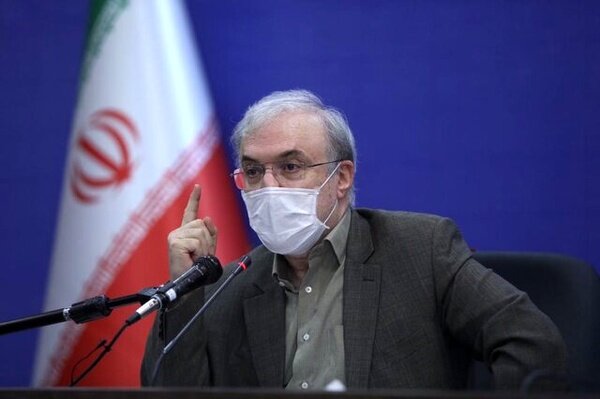HIV control in Iran unfazed by COVID-19: minister

TEHRAN – Health Minister Saeed Namaki has said that the COVID-19 pandemic will not threaten under no circumstances the HIV control program in the country.
In a message on the occasion of World AIDS Day, December 1, the minister said: “The world health system today stands in an unpredictable, constant, and rapidly changing situation. On the one hand, the world’s attention has been drawn to the COVID-19 pandemic and its effects on people's lives and livelihoods, and on the other hand, the rest of health services based on rights-based approaches have been affected by the pandemic. That the most sensible one is the HIV epidemic.”
HIV pandemic requires "global solidarity and shared responsibility” to be expanded day by day to ensure that health systems are strengthened enough to empower people with knowledge, increase fair access to diagnosis, treatment, medications, and other specialized needs for those living with HIV or at risk, he noted.
Although the efforts of the last forty years to fight this epidemic have achieved great successes and improvements, it should be confessed that still there are many challenges in the way of the global health system and human societies, he highlighted.
Forty years of responding to the HIV epidemic has taught us valuable lessons on ensuring an effective and appropriate response to the epidemic, if it is implemented based on justice-oriented approaches, community-oriented, knowledge-based, conscious approach, take into consideration the cultural and beliefs of society, trust, and prioritizing the people who are at most risk of affecting HIV/AIDS.
World AIDS Day is special to us. So, the bylaw on prevention of stigma and discrimination against people living with HIV has been prepared by the Ministry of Justice in cooperation with the Ministry of Health, he emphasized.
It is also planned to submit the bill on HIV prevention and control to the parliament with the joint endorsement of the two government entities, Namaki added.
“Access to all preventive and treatment services including diagnostic tests, medications, prevention services, harm reduction services, mental health, and the most modern and specialized diagnostic laboratories is available for patients all over the country.
What we have done so far to end the AIDS epidemic not only has not demoted because of the COVID-19 but also is moving forward with full power and Iran has not given up on any of its wide efforts to eradicate the disease.”
HIV programs during pandemic
“The HIV guidelines for the care and treatment and distribution of HIV medicines were reviewed and revised.
All effort has been made to replace as much as possible the online services instead of in-person services, subject to the point that the program does not harm and satisfaction of people living with HIV and their families is provided.
Educational materials entitled "What People Living with HIV Need to Know about COVID-19" were made available for them regularly through virtual networks.
An international assessment that was conducted at the peak of the COVID-19 crisis was found out that 98 percent of people living with HIV had access to medication for at least one month, 71 percent had access to mask, and 81 percent had access to disinfectant solutions and 91 percent had access to harm reduction packages.
A survey conducted in two cities including Tehran and Isfahan on 1276 PLHIVs, revealed that only 26 people were infected by COVID-19. Although this study is still ongoing, it shows how much awareness among people living with HIV, as well as their families about COVID-19 is high.
Fortunately, with all limitless efforts, HIV rapid diagnostic tests were made available throughout the country,” Namaki explained.
One of the most important pillars for the success of the HIV program in the country is extending cooperation and coordination with international organizations under the United Nations system and benefited from their scientific and technical capabilities over these years.
At the moment, the first challenging part in the way of the HIV control program is the COVID-19 epidemic and dramatic spread of the virus in the world, which has inadvertently affected many areas of the fight against HIV in the country, he also stated.
World AIDS Day 2020
World AIDS Day is an important opportunity to recognize the essential role that communities have played and continue to play in the AIDS response at the international, national, and local levels.
The theme of this year was “Global Solidarity”.
The world has made significant progress since the late 1990s, but HIV remains a major global public health issue. And like many other major health issues, it faces additional challenges during the COVID-19 pandemic.
HIV prevention, testing, treatment, and care services are all being disrupted particularly in countries with fragile health systems. Nevertheless, all over the world, health workers and community representatives are doing their utmost to keep services going.
Globally, 37.9 million people were living with HIV at the end of 2018. An estimated 0.8% [0.6-0.9%] of adults aged 15–49 years worldwide are living with HIV, although the burden of the epidemic continues to vary considerably between countries and regions.
Over 40,000 people diagnosed with HIV
Parvin Afsar Kazerouni head of AIDS and sexual disease control department at the Ministry of Health said in December 2019 that since the beginning of the epidemic, a total of 40,735 cases of HIV have been registered in the country, 60.1 percent of which were infected with drug injection equipment and 22.2 percent due to high-risk sexual behavior.
Men held a share of 82 percent and women 18 percent among people infected with HIV, she lamented, adding, 50 percent of the patients age 20-35.
Referring to the newly diagnosed cases of HIV in the first six months of this year, she said that about a thousand people have been diagnosed during this period, 31 percent of whom were women and 69 percent were men.
FB/MG
Leave a Comment